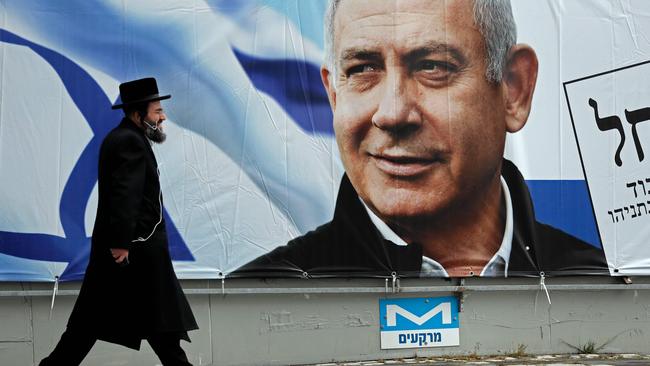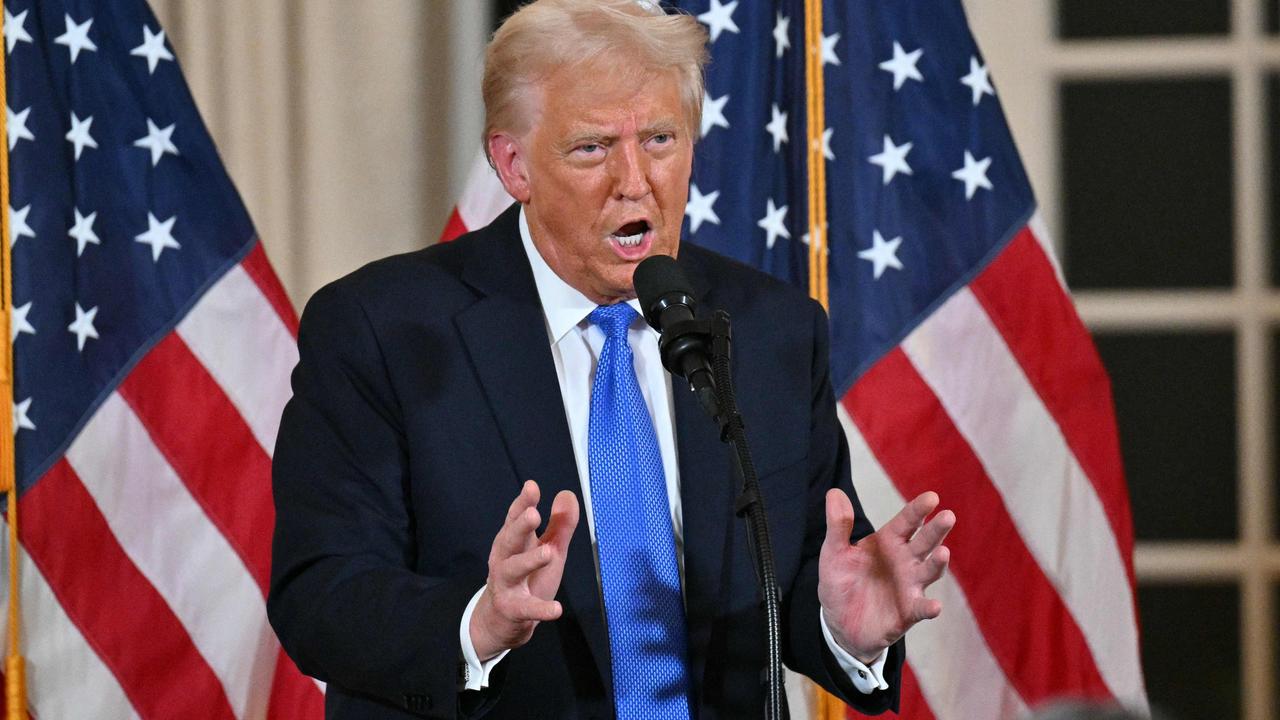Israel election a vote on the reign of King Bibi
The Israeli election has become a referendum on the legacy of Benjamin Netanyahu, as he warns his rule is in danger.

Benjamin Netanyahu’s quest to become Israel’s longest-serving prime minister is a referendum on his decades in public life.
The race is tight. Most final polls showed a fluid situation ahead of today’s vote with exit polls giving neithe rMr Netanyahu or his main rival Benny Gantz a clear lead.
Mr Gantz, a former general, drew slightly more seats with a message focused on voter fatigue, corruption allegations and quality-of-life issues.
But small right-wing parties were forecast to do well enough to put Netanyahu in a better position to cobble together a coalition government.
Still, Netanyahu has warned voters in recent days that his right-wing rule is in danger, in what Israelis call a “gevalt campaign”, borrowing from the Yiddish phrase expressing a sense of doom or fear.
“If we don’t change the current trend, we are going to lose,” Netanyahu said at a meeting described by his Likud party as an emergency session.
Surpassing Ben-Gurion
Even if Netanyahu doesn’t manage to surpass Israeli founding father David Ben-Gurion’s years in office, he has irrevocably changed Israel’s political landscape and its role on the world stage, contributing to and benefiting from a rightward shift in the once socialist country.
With Jewish-Israeli support for a Palestinian state at its lowest levels in 20 years, his opponents have little interest in a big change in direction.
A victory would strengthen his status as a world leader and historic Israeli political figure. He has appeared to relish the election as a plebiscite on him personally and has largely campaigned as a statesman, meeting US President Donald Trump and Russia’s Vladimir Putin to press the point that he is indispensable.
Hebrew University political science professor Reuven Hazan says: “This is going to end up being a referendum on Netanyahu because he’s made it so; he’s saying, ‘I am the only one who can play at this level internationally’.”
The needle has moved so much during his 13 years as prime minister, first in the late 1990s and then from 2009 on, that policies once considered up for debate aren’t major issues in his re-election bid.
Polls show most Jewish voters agree with him when he says Jerusalem will be the undivided capital of Israel, the Jordan Valley claimed by the Palestinians will remain under Israel’s control and that Israel will hold on to major settlement blocs.
Wooing conservatives
To cement right-wing support, he said in a TV interview over the weekend that he would extend Israeli sovereignty over parts of the West Bank if he is re-elected, a major policy shift that would stir Arab opposition and pose a test for Trump’s push for regional peace.
He also says he is discussing annexing parts of the contested territory Israel captured in 1967.
His opponents “don’t really suggest to the public an alternative in terms of policy; they don’t come to the public and say we will achieve peace and security by doing that or this in a different way”, says Gideon Saar, a top Likud candidate who will land a senior government position if Netanyahu forms the next coalition.
Netanyahu also has presided over a period in Israel’s economy in which unemployment has declined after the financial crisis while Israel’s tech sector has continued to boom.
He has touted the economy’s success under his tenure. Economists warn Netanyahu would have to institute austerity policies to counter the effects of spending on social policies while cutting taxes in his last term.
Graft charges
Gantz, Netanyahu’s former army chief of staff, had shot ahead in polls by offering himself as a fresh alternative.
He has attacked Netanyahu over bribery and fraud charges he faces in three corruption probes and a government he says no longer works for its citizens. Netanyahu denies the charges and calls them politically motivated.
“Enough Bibi” is the slogan behind Gantz’s latest series of television ads, launched last week. They feature ordinary Israeli complaints about healthcare and traffic — issues that opponents say Netanyahu has ignored.
“I think Benjamin Netanyahu has done a lot for the country,” Gantz said at an event last week, praising the Prime Minister’s service in the military and recalling his brother, who was killed in action. “But as we say, enough is enough.”
Under pressure from then US president Barack Obama in 2009, Netanyahu agreed to a settlement freeze and voiced support for a Palestinian state, but he had argued against one long before his political career began and since the 2015 elections has vowed he won’t permit one.
Gantz has avoided discussing a Palestinian state but has tried to inject hope into the process by saying he would talk with Arab leaders about “the process of separation from the Palestinians”.
He had said he would amend a controversial bill passed last year that enshrines in law that Israel is a Jewish nation-state, a move Arab-Israelis said made them second-class citizens.
Netanyahu backed the bill and fiercely defended it.
Gantz has attacked Netanyahu’s ceasefires with Hamas, the ruling party of Gaza, amid frequent violent flare-ups. Gantz says the approach has diminished Israel’s deterrence power, and has suggested retaliating more forcefully than Netanyahu has, though what that looks like is unclear.
Diplomatic navigator
Netanyahu has been in power for so long that many Israelis can’t imagine life without him, earning him the nickname “King Bibi”.
He was first elected prime minister in 1996, defeating Labor’s Shimon Peres, but lost three years later to Labor’s Ehud Barak.
He then went into the private sector and served as foreign affairs and finance minister before being elected again as premier in 2009, 2013 and 2015.
Netanyahu says no one’s credentials could match his.
“What is important is who leads, the diplomatic navigator. I’m working against Israel’s greatest enemies. They aren’t,” he said of his opponents, according to an interview last week with Israel Hayom, a newspaper owned by billionaire casino magnate Sheldon Adelson and seen as pro-Netanyahu.
So far, Netanyahu has deflected damage from the Israeli attorney-general’s recommendation that he face charges for bribery and fraud. Many of Netanyahu’s core supporters say he deserves the chance to defend himself in court.
Says Eyal Laor, a personal trainer who has long supported Netanyahu and his Likud party and sees no other alternative: “I love everything about him. He is still innocent until proven guilty.”
Others who generally agree with Netanyahu’s positions say it is time for him to go.
“Someone who has been in power for too long tends to want to stay in power and is focused on staying in power rather than leading the country,” says Avi Kolel, 32, a former Netanyahu supporter who is an engineering student in Tel Aviv.
Some previous Likud voters say they are considering backing Gantz or smaller parties — not to throw Netanyahu out but to try to send a message that he should moderate.
Hank Citron, 82, a Netanyahu supporter from the central coastal Israeli town of Netanya, says he hopes Gantz does well enough that Netanyahu must put him in government and change tack.
Citron says parts of Israeli life have been neglected.
“The main issue has always been defence,” he says. “It’s time now to think about education and other things.”
The Wall Street Journal


